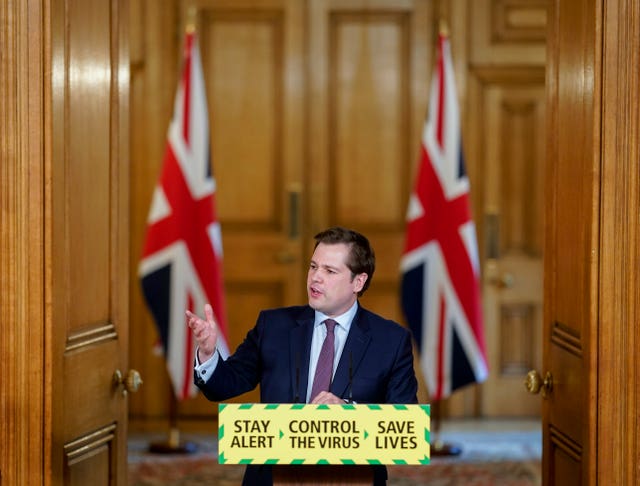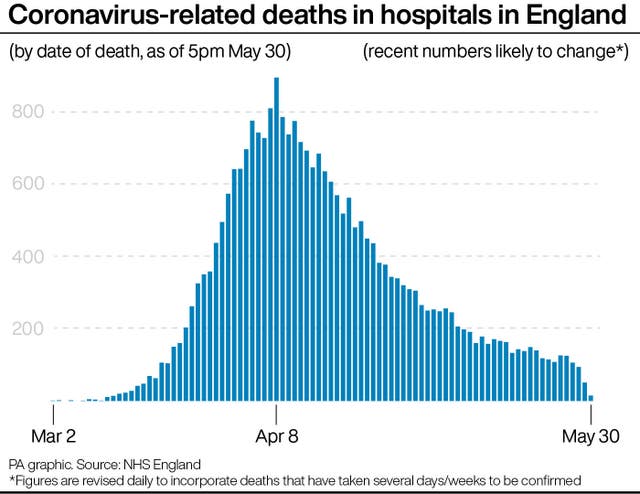People who have been shielding for weeks to protect themselves from coronavirus will hopefully get more tailored advice in the future, a Cabinet minister and senior medic have said.
The Government has pledged to look again its advice to the clinically extremely vulnerable as part of each review of social distancing measures for the wider population.
It comes in the wake of criticism that people shielding, more than two million in England alone, were left feeling forgotten when lockdown easing measures were announced last week for the general public.
Charities are calling on the Government to reveal the evidence on which it has based its decision for the change, saying it has come “out of the blue” and “adds to the impression already created that the shielding group isn’t high enough on its list of priorities”.
This weekend a slight change to the guidance to those in the shielding category, who were advised back in March to stay indoors, was announced.
The change in advice, described as “modest” by Communities Secretary Robert Jenrick, sees those who had been shielding told that from Monday they can now spend time with other people outdoors.
Those considered extremely vulnerable will be able to go outside with members of their household while continuing to follow social distancing guidelines.

And those who live alone can meet outside with one other person from another household, also adhering to social distancing guidelines.
The next review of shielding measures will take place in the week beginning June 15.
Both Mr Jenrick and England’s deputy chief medical officer Dr Jenny Harries stressed that the guidance is advice, rather than a strict requirement.
Mr Jenrick said the new change does not amount to telling people to stop shielding.
He told the daily Downing Street briefing on Sunday: “We’re not today asking people, or advising people, to stop shielding.
“Far from it. What we’re saying to the people who have been shielding for the last 10 weeks is that we think that the rate of infection is sufficiently low now to enable you to do some quite modest things like going outside for a walk with members of your household, or like if you’ve been living alone, meeting somebody from another household.”
He said the “small changes” will have a “huge impact” on people’s mental health and wellbeing “while still continuing to ensure they’re protected by being at home and reducing the amount of face-to-face contact that they have with people outside their household to the absolute minimum”.
Dr Harries said the understanding of individual risks with individual diseases is “still a learning process” and cautioned that “nothing will ever be 100% safe”.
The pair said work is ongoing to try and ensure more nuanced advice can be given to people most at risk in future.
SHIELDING THREAD (1/3)
From Monday, the 2.2 million people who’ve been shielding can go outside for first time.
This will be with either members of their household, or, if they live alone, to meet one other person.
Full guidance will follow tomorrow.
— Robert Jenrick (@RobertJenrick) May 30, 2020
Mr Jenrick said the Government’s medical advisers are “producing advice as to how we can give people more specific, tailored advice to their own condition rather than the blanket approach that we’ve done so far”.
Dr Harries said work is being done to ensure a “new approach” is ready for if there is a second wave of the virus.
Earlier Professor Peter Openshaw, who sits on the the New and Emerging Respiratory Virus Threats Advisory Group (Nervtag) to the Government, said future guidance is likely to be more fine-tuned as more becomes known about Covid-19.
He told the BBC’s Andrew Marr programme: “I think we’re going to be able to fine-tune the advice now and actually reassure some people who we feared might be susceptible, that in fact they’re not as vulnerable as we thought.”
Despite the change for those shielding, it is “probably a little bit too early” for a similar move when it comes to advice not to visit care homes, Dr Harries said, given the level of risk involved.
She said: “In a care home setting it is very important that the level of infection is kept very low because it is an accumulation if you like of a number of very, very vulnerable people often.”
Prime Minister Boris Johnson thanked everyone who had followed the shielding guidance to date and paid tribute to their resilience, and Mr Jenrick reiterated his own thanks on Sunday.

While the latest guidance is for England only, the Government is working closely with the devolved administrations in Scotland, Wales and Northern Ireland “who will issue their own guidance in due course”, Mr Jenrick said.
Charities cautiously welcomed the slight change in advice, but said people will want to hear the scientific evidence behind it.
Steven McIntosh, director of policy at Macmillan Cancer Support, said the decision was “a step forward” for a group who “have felt left behind and forgotten” as lockdown is eased for others in England.
Phil Anderson, head of policy at the MS Society, said people would “rightly want to hear a lot more about the scientific evidence showing this will be safe for them”, after a decision which he described as having “come out of the blue”.
Gemma Peters, chief executive of Blood Cancer UK, criticised the Government’s approach, saying: “The way it has announced this on a Saturday night with no warning or consultation with charities and clinicians has created confusion and this adds to the impression already created that the shielding group isn’t high enough on its list of priorities.”
She said the charity is “urgently seeking clarity” from the Government on the advice and added: “Until we get it, we advise people to speak to their healthcare teams before making any changes.”




Comments: Our rules
We want our comments to be a lively and valuable part of our community - a place where readers can debate and engage with the most important local issues. The ability to comment on our stories is a privilege, not a right, however, and that privilege may be withdrawn if it is abused or misused.
Please report any comments that break our rules.
Read the rules here